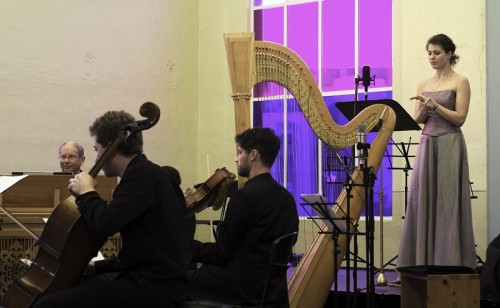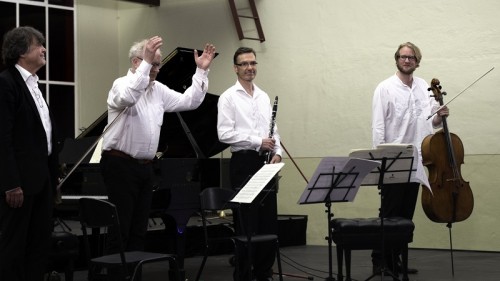YESTERDAY’S “Quartet for the End of Time” concert represented some of the most challenging and interesting pieces of the music festival.
Predominantly modernist works from Scandinavia and France, with the odd Puccini aria thrown in, the program built to a superb performance of Messiaen’s unparalleled “Quatour pour la fin du Temps” (Quartet for the End of Time).
Soprano Simone Riksman demonstrated the full dramatic range of her voice in ethereal presentations of songs by Toivo Kuula and Jean Sibelius. Bengt Forsberg’s accompaniment was stately—sometimes thunderous, always expressive. In Sibelius’s work for solo piano, “The Spruce”, he was magnificent, allowing chords to build in resounding layers without ever losing clarity of individual notes.
A special feature of the program was the world premiere of “Agnus Dei” from “Missa a cappella” (2011) by Finland’s loved composer Einojuhani Rautavaara. Conducted by Christopher Latham, Uppsala Chamber Soloists, ANAM String Quartet and double bassist Justin Bullock launched this work with quiet appreciation. “Agnus Dei” could only have been written with a deep understanding of harmonic tension. Simple lines climb into tritone dissonance before opening splendidly into clear and consonant space.
But it was Messiaen’s “Quatour pour la fin du Temps” that I had waited for over the course of this entire festival. Inspired by a passage from Revelation “and the angel lifted up his hand to heaven, and swore by him that liveth forever and ever… that there should be time no longer”, Messiaen wrote his quartet while an inmate at the notorious Stalag VIII concentration camp. Rather than embodying the sadness and horrors of war, Messiaen transcribed songs of the birds flying over the camp walls into freedom. “Quatour pour la fin du Temps” was premiered inside Stalag VIII – an extraordinary day when guards and prisoners sat beside each other to listen to new music. Messiaen once remarked that they had been the most appreciative audience of his career.
Bernt Lysell, Erik Wahlgren, Bengt Forsberg, Craig Hill elegantly manifested Messiaen’s difficult additive rhythms and highly complex birdcalls, creating an atmosphere of prayer and restrained joy. Birds, for Messiaen, represented the intermediaries between angels and humans, the triumph of light over matter and a means by which a human being could gain an understanding of God. Hill was astonishing in his performance of the solo movement for clarinet, “Abîme des oiseux”. His notes seemed to emerge out of nothing, vanishing back again to nothing. With a flawlessly even tone, Hill produced sustained organ-like tones interrupted by rapid outbursts like flights of garrulous birds.
The delicate balance of this quartet was kept by Forsberg, whose piano tones resembled, at one time, church bells, and at another, a child’s music box. “Quatour pour la fin du Temps” contains some of the most beautiful music ever written for cello. In the poignant adagios, Wahlgren brought Messiaen’s impossibly long lines to life with almost indiscernible changes of the bow. Like the cello, Messiaen’s violin lines are evocative and challenging. Moving through shifting palettes of instrumental device: sul tasto, battuto, harmonics, Lysell brought the work to a close in the stratospheric high register of the violin. His last note rang out sul ponticello, at the softest pianissimo – almost inaudible but steady, a quiet affirmation of joy in the squalor of the camp.
The post Review: Atmosphere of prayer and restrained joy appeared first on Canberra CityNews.

